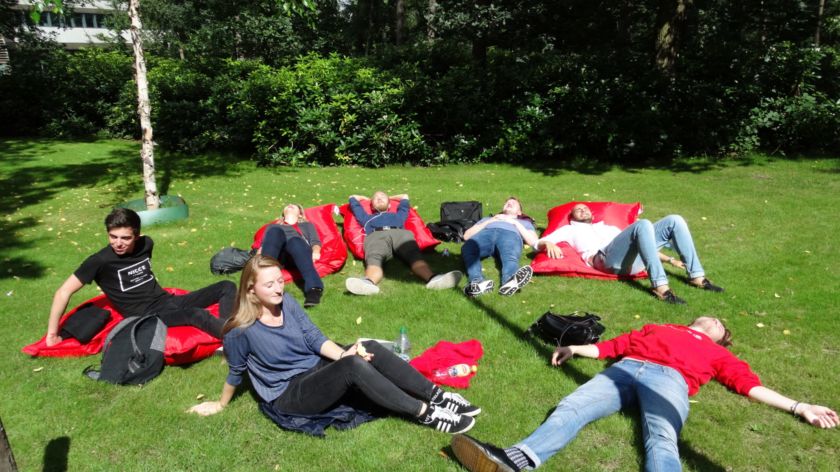A holiday in the lab
-
 Summer students in 2016. Photo: Summer School
Summer students in 2016. Photo: Summer School
Three times before, Radboud Summer School brought international students and scientists to campus, in the middle of summer. Why do students, teachers, professors and PhD students want to spend their summer in a classroom?
While a languid summer rest takes over the Radboud campus, one spot is still full of life: the Radboud Summer School office. ‘It is a weird group of people, the group that wants to work in summer’, says coordinator Alice Nieboer. ‘But that is why the atmosphere is so good. Everybody who wants to do this is excited about their field of expertise and wants to tell people about it in any way possible.’ This year, the fourth edition of Radboud Summer School will take place and so far, 700 people have been admitted. In 2014, during the first edition, 270 people from all over the world enrolled in the programme.
‘It is not a program for enthusiastic pet shop owners’
During Summer School, people can follow courses on all kinds of topics, from addiction or gender issues to biodiversity or kidney transplants. Between the 7th and the 18th of August, the summer students come to campus for one or two weeks. On top of that, they can follow a social programme. The courses are taught by professors, associate professors and PhD students, mostly from Nijmegen, but also from partner universities. For example, there will be a course about Brexit this year, taught by visiting professor John Hodgson of Nottingham Trent University. ‘This way, it is possible for Radboud students to have an international experience without having to go abroad’, says Nieboer.
Zebrafish
One of the professors who spends his summer on Summer School is Gert Flik, professor organismal animal biology. He leads the course ‘Zebrafish as Models in Biomedical Research: Focus on Gene, Brain and Behaviour, a course about zebrafish research. ‘We have a unique possibility set when it comes to zebrafish research. It attracts all kinds of international students and scientists who are interested in biomedical research with animal models’, he says. ‘Zebrafish are suitable for humane research, in other words: next to mouse research, they can tell us a lot about ourselves. For example about behaviour, psychology and genes, we share our roots with fish. But that is not the only reason we study them. On an aquacultural and biomedical level, the fish are also very interesting as an translational level.’
‘It is a chance to profile our department’, says Flik. ‘On top of that, we do it because of our enthusiasm for education. We are a group of teachers that have teaching in our blood.’ The programme he put together is quite specialist. ‘We have admission requirements, so we can do a lot in a short period of time. It is not a program for enthusiastic pet shop owners.’
Tasting
According to Nieboer, the summer school is important within the internationalisation ambitions the university has. ‘The week people spend here is basically an orientation on Radboud University. People can taste what it’s like here and some programs are already starting to see the benefits of this. Cognitive Neuroscience, for example. Some students have really chosen that programme because of the Summer School course.’ To find out the effects of Summer School, Nieboer and her colleagues ask people to fill out a survey. ‘We want to know how they found out about us, and what their image of Radboud University was’, she says. ‘It shows that a lot of people did not know about us before they came here. Many of them are pleasantly surprised.’
The call for next year’s course ideas is sent out already. ‘The faculties decide whether they want to join in and how’, says Nieboer. ‘No plan is forced on them. So now, we ask the faculties to think about 2018’s programme.’



